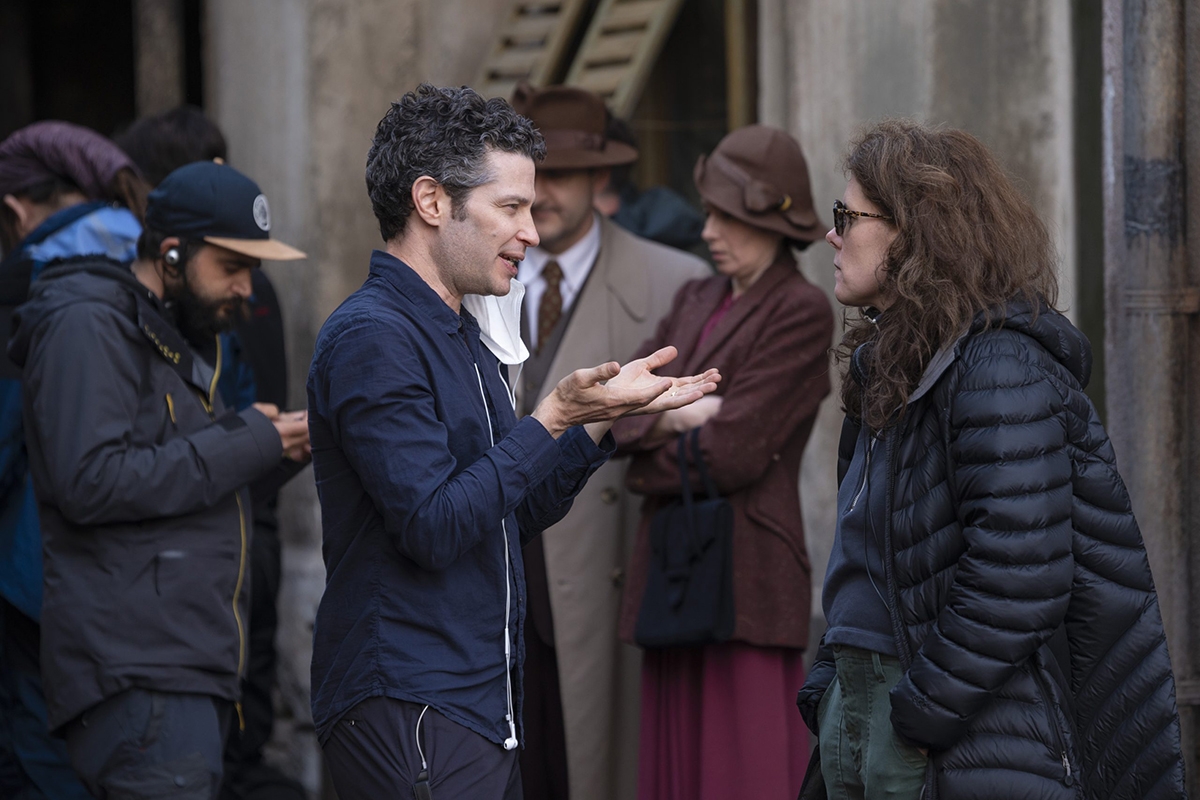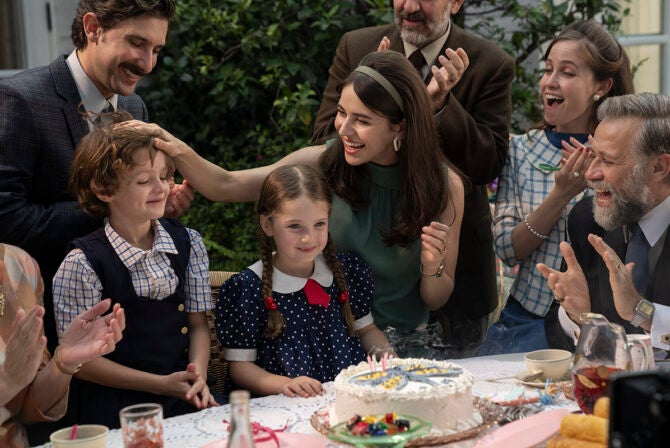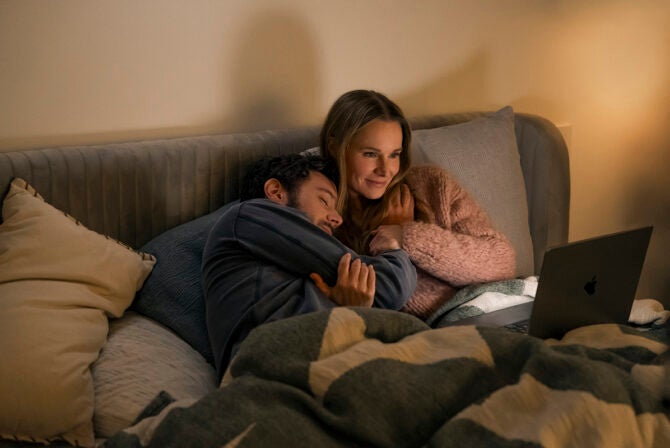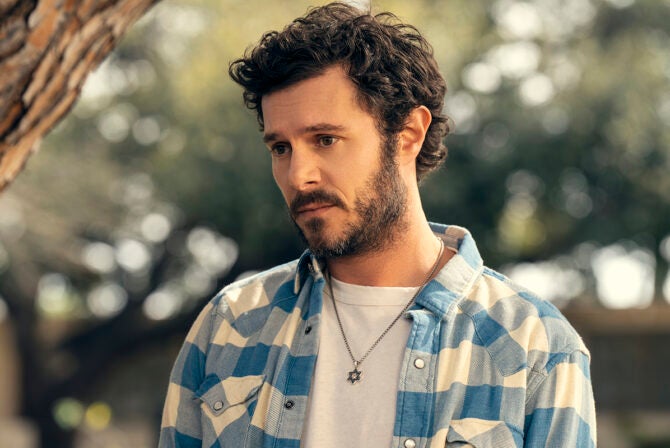You probably know the work of Thomas Kail, or Tommy Kail — no one in the cast of Hulu’s “We Were the Lucky Ones” called him anything but Tommy, and when they did, they did it with obvious fondness and admiration. Kail is perhaps known best for directing the original musicals of “In the Heights” and “Hamilton,” the TV show “Fosse/Verdon” for which he was nominated for four Emmy awards, and won one (and also where he met his wife, Michelle Williams!). He also won two Emmy’s for his work on the 2016 musical “Grease Live!”
Kail was the executive producer and director of “We Were the Lucky Ones,” a show based on his friend Georgia Hunter’s book, which fictionalizes the incredible story of how her grandfather Ady and his family — all Jews from Radom, Poland — survived the Holocaust. It is Kail’s most Jewish project, and also an incredibly personal one. “We Were the Lucky Ones” helped connect him to his own family’s story of resiliency and survival, and to the Jewish idea of l’dor v’dor, from generation to generation.
When I spoke to Kail this past Spring, he kept coming back to “Fiddler on the Roof” (in 2020, it was announced that Kail would work on a “Fiddler” movie adaptation). In a way, it felt like “Fiddler” was Kail’s Torah, the Jewish text he keeps coming back to, the story that informs all of his work. When he explains the way he’s put music to stories about otherness and persecution and home, muses over the idea of ones looming mortality and continuity, and leans into the very Jewish idea of mixing the bitter with the sweet at every moment, “Fiddler” is present. These are all themes we know so well from the story of Tevye the milkman and his daughters, all themes that are ever so prescient in “We Were the Lucky Ones,” all themes that feel so, so Jewish.
But we didn’t just talk about “Fiddler.” Kail talked to Kveller about his Jewish grandma’s 100th birthday, the idea of Anatekva and the role of music in the Hulu limited series.
I just finished watching the finale of “We Were the Lucky Ones” and I cried so much.
Erika [Lipez, the showrunner] delivered such a gorgeous episode of television. And that was one that she wrote while everything else was going on. And we knew we had to, you know, we had to bring this thing home. We’d put so much into it. And when that script came in, I just thought: She did it. Now my job is to go and realize that with this company. The cast was so dropped in, months into shooting — they’re now seven, eight, nine months of living with these characters. We could throw anything at them, they were just so inside that experience and those characters and I just felt the release of watching them reunite both as humans and as characters. Shooting that final Passover scene… that day was such a big day. There was so much laughter and so much joy and so much pain, all of it right next to each other, which is — Jewishness.
I loved that scene. Passover is such a major Jewish holiday and it’s a time when we tell the story of both our persecution and our victory. I loved how in that final Passover seder scene, they light both the Shabbat candles and yahrzeit candles for the family members they lost in the Holocaust.
Yes, the need to call out to remember, to say “we are here and this is who is not” — it’s so embedded in our culture. And it was so beautifully rendered by the company. We have those moments, then the [Four] Questions, and then the crack of the matzah and then all of a sudden — the laughter can be there too. But you can’t get to one without the other.
Yeah, as a parent, watching little Felicia, a child who just survived the Holocaust, sing the Four Questions was so moving.
I know! Here she is standing on that chair. And the way that Hadas [Yaron, who plays Mila, her mother] and Michael [Aloni, who plays Seilm, her father] look at her, like they’ve practiced those questions with her — that’s the way we all would look, right? And then she does it, and… This is the thing about ritual and tradition. It’s like, “you go find [the afikoman,]” “you go find it,” and then eventually it’s your kids that go find it. We’re seeing the transition, you know, from one Passover dinner nine years earlier in episode one to this dinner.
This is your most Jewish project as of yet. Did you ever envision that you were going to work on a Holocaust project?
I’ve spoken very publicly about my deep affection for “Fiddler on the Roof.” “Fiddler” was a huge influence on really everything I’ve done, starting with “In the Heights,” which is a story of our community. The story of “Fiddler” is the story of “In the Heights.” I was starting to think about where I come from, and what that means in the oral tradition. Working in the theater is so much about using the spoken word to pass on a story.
Georgia [Hunter, the author of “We Were the Lucky Ones”] and I have been friends for a long time, since 1999. And so as she decided to do research and write this book, I feel like there was this parallel thing happening for me. I was also on a discovery of finding out… Most of my family comes from Poland and Russia and came to the the Lower East Side of Manhattan. I knew the Lower East Side of Manhattan portion [of our story] pretty well. But I wanted to go back further and I think in many ways this, [Georgia’s] book allowed me and encouraged me to dig into that, to ask [my family] questions. I have a grandma who just turned 100.
Mazel tov!
By the way, this is like most my grandma thing: We had our 100th birthday party in November, and we were watching this wonderful slideshow one of my cousins put together with over 10 decades of photos, and we were sitting there, and I’m sitting next to my grandma, and she said, “Well, this is hard to see.” And I said, “Grandma, I can imagine…” I was thinking about how to comfort her and I said, “Is there anything I can do?” She said, “Yeah, move it closer.”
That’s so funny!
Like, that’s my grandma at 100. That really tells you everything you need to know about my grandma. That’s how you get to 100. Because my grandma is here, and the others aren’t, and the things that she remembers now are quite different than she did 5 or 6 years ago. But her memory was remarkably intact, so I would just sit and ask her questions. I would tell her about this book, I would tell her about these stories and I would ask about my own family stories. And so I hope that this show encourages anybody who finds it to dig into their past.
Tell me a little about your grandmother’s story?
She was born in the Lower East Side. So her big joke was my grandma lived on 6th and Avenue D and my grandpa lived on 13th Street. So she thought he lived uptown. It’s very Lower East Side humor. They met at the 14th Street Y when they were= probably 12 or 13 and they were together for 65 years. I have a great aunt, her name was Sally Gross, and Albert Maysles actually made a documentary about her: “The Pleasure of Stillness.” I don’t even know if you can find it anymore. It’s this 55-minute documentary, she lived in the Westbeth, which is this amazing artistic building down in the lower west part of Manhattan. She tells the story of getting the check from the NEA — she went to Hunter College, and she got a grant to dance. My great-grandparents never learned to speak English and couldn’t read or write, and so the kids would do that for them. My great-grandmother saw the numbers on the check, and so my great aunt said to her, “they’re giving me some money.” And my great-grandmother said to her, “only in America, would they give you money to move your feet.”
I remember seeing this [scene] at a screening of the documentary in 2007 or 2008 and — I’m not from a family where there’s a lot of people that made art. She was the one. And something in me unlocked. I cried in the most profound way hearing that because it made me understand: “Oh, with no her, there is no me.” Without Sally, there is no me. And just the understanding of the sacrifice, the understanding of how far the refugees traveled, and my family, so that I could be here. I think that all of those things just felt like they were swirling somewhere and Georgia’s book and Erica’s scripts gave me a chance to access a lot of that.
What was the place of Judaism in your life growing up, and then what is it in your life now, as a parent?
It’s fascinating. Both my parents were raised quite religious. My mother had her bat mitzvah in the 50s, which was not the most common thing. She grew up in Squirrel Hill, Pennsylvania, which is a very Jewish area of Pittsburgh. My father was born on Long Island but grew up in New York City and went to Hebrew school until he was in college, so their relationship to religion was one where they felt [it wasn’t] their choice.
And so when it came to raising their own kids, they sort of asked us what we wanted to do and gave us the choice: go to shul or Hebrew school or go play soccer? I was like, I want to be outside. When I turned 11, 12, 13 and started to meet other kids that were going through their bar and bat mitzvah, I started to understand that things I thought were only my family, maybe were not just my family. I started to understand my Jewishness in a way by meeting other families and understanding, oh, there’s a nonreligious aspect to this that I’m starting to uncover. I just thought it was my family and then all of a sudden I was like, “Oh, that happens at your house, too!” When you get upset, you don’t say, I’m sorry — you just make them a sandwich.
Our connection to the past and what we leave behind is really at the center of everything I do. Running out of time is a big theme in my work. For me, Jewishness and family are so interrelated, and so how that will express itself in terms of raising little ones is — I think about how different my experience from my parents’ was and how so much of being a parent is learning from what our parents did, and then saying: This is how we’re going to do it. So the fact that we still have generations with my great grandma still present makes me feel more connected to [Judaism] and makes me think about it differently. These last seven years of working on this story have certainly had a huge contribution to that.
What were, for you, the most activating or hardest scenes to shoot in this project?
The scene with Halina and the beet field in the first episode. That’s her first witnessing profound violence in such close proximity. We made a very conscious decision to not show the violence, but just the response to that trauma and seeing that, and how it impacts her — those moments certainly stay with you.
One of the things we tried to do was to create a safe environment on set… so that we can navigate those moments. Sometimes you can identify the one that’s going to move you, rock you — and sometimes you can’t. Sometimes it’s the little thing that sneaks up on you. Like leaving the apartment in Radom. I think about that scene where Nechuma, the mom, says goodbye to the apartment in that second episode and what that must have felt like for Robin [Weigert] who plays her… These things could be only half a page but are touching that center, with such palpable and true honest feelings. You never know where it’s going to come from. So we just tried to build an environment around that… to support each other.
There’s also that scene in the finale when Nechuma comes back to Radom… She’s kind of keeping it together the whole time, trying to survive, and then coming back to their apartment in Radom, and the people at the door are not letting her in to what used to be her home and then she falls apart and yells at them, all these memories that she had in it, all these dreams she had as a parent — it’s so activating.
You know, when you think about “Fiddler,” so much about it is — you have only the things you can carry in your sack, because eventually someone’s going to come and you’ll have to leave right? That’s why the Jews play small instruments; the violin is something you can take with you. And so for this family, which have music in the center, to leave that piano, to leave everything behind in 30 minutes, your whole life… and then what it feels like to walk back into that space… What Robin was offering there was so unbelievably honest and generous, that my job there is just to bear witness and to try to capture it. You know that the memories of that house come flooding through her. I mean, it moves me talking about it — it’s a testament to the wellspring that she was drawing from.
I was just thinking about “Fiddler” — the idea of where is Anatevka, what is a home? When the family returns to Radom, when Sol [the father] realizes this isn’t for us anymore, this isn’t our place. There is something about the pain of that, of understanding that a thing that was everything you needed has now changed, and it’s something that is not either needed or useful for your spirit to continue on. I think of that sense of resilience… Then where do we go, where does that bring you? And for Ady then to take them all the way across the world, to Brazil. It’s that kind of intrepid and fearless spirit.
I was actually going to ask if you’re still working on a “Fiddler” movie adaptation.
I’m not presently, but we shall see. Look, it takes one musical to break through and then everybody says, “where’s the musical?” There have been some really incredible musicals made over these last few years that are finding audiences in different ways. I feel like, there’s a moment for it and I don’t know when it will be, but I hope it’s soon.
So this series isn’t a musical, but it is a musical series. Music is a really big part in it, with Logan Lerman’s Ady being a musician, and Michael Aloni’s Selim singing a Polish lullaby, and the soundtrack… Can you talk a little bit about what the approach to music was?
Well the beauty is, it’s in the book, right? [When you read the book,] you can read about all of Ady’s songs and hear about Felcia’s lullaby. But we had the opportunity to experience it. [We said] let’s take all the language away and let him play, let’s see what it’s like to watch him at the piano where he’s most alive.
Rachel Portman and Jon Ehrlich wrote our score and I think the score is just beyond. The notion of being able to express musically, because there aren’t words, is something that they were able to do — we could talk about the emotion of a moment, without having to talk about notes and instrumentation, and they would come back to us and we could find each other. So Ady’s desire to compose and to write, how that goes away and then comes back, is a metaphor. The arts are one of the first things that go away during times of destruction. Silence — that’s one of the other things that happens. When the musicals close, when all the forms of expression are also quieted. And so to watch him reemerge as a creative spirit, I think is something that Logan renders so movingly in this.
And then there’s Jakob with his camera, trying to capture everything as much as he can, for as long as he can, and coming back to it on the train when they leave Poland for a ship to America.
It’s a document saying “we were here.” To take [something] from the oral tradition to the written word is also trying to carve something out and leave a mark. I feel like it’s what Georgia did by writing it. It’s what so many others have done. It’s what Georgia trusted Erica to do. It’s something I think we all felt deeply and wanted to honor.
Want more TV content? Join our Jewish TV Club substack!








